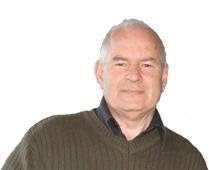I'm not used to the sound of gunfire and I hope I don't hear it again. As a New Zealander and coming from a peaceful country and not being exposed to such violence you go back and think wow actually that was all a bit crazy being up on the upper deck with the bullets flying around everywhere.
There was nothing in our planning that involved any form of defence or violence. We knew something was going to happen. We thought they may have just tried to block us. [Israeli boats were] chasing. It is one memory that I probably won't forget and stands in my mind is the sound of the engine of the Mavi Marmara accelerating before I even reached up to the upper deck. At the same time the helicoptor started hovering over the roof of the boat.
[The sound of weapons] penetrates into your hearing so deep. You're trying to work out what's going on. It's very disorientating. It's very hard to tell where it's coming from. I know it's coming from the zodiacs and I know it's coming from up in the roof and it's coming down the starboard side of the boat which I was standing on. There was so much noise. They were landing everywhere.
I thought I had [taken cover] by going near the top of the boat so the helicoptor was obscured behind it. I'm automatically thinking there's no way they would attack this flotilla using live ammunition. It just doesn't even enter the head that they would use live ammunition. I'm thinking rubber bullets.
The first fatality was a photographer. He was holding his camera up to take photographs up on the roof and he received a bullet in the forehead. So I knelt down next to him, put my hand under his head, not thinking, and then I realised the extent of his injuries. This was the realisation that things had got crazy. He was still breathing. I understood the sound of the breathing from when my grandfather died. So I knew he didn't have long. I just held his hand. I just thought his family wasn't there. I thought this brave man, who was only taking a photograph, is alone and it's his last moments.
What we went through on that flotilla, from being shot at, killed, bound for long lengths of time, this is what the Palestinians live with every day. Every day.
This blockade has to stop. It can't go on. These people have the right to rebuild their lives, rebuild Gaza.
I can speak for myself, and I can speak for my colleagues, and I can speak for the people who were also part of the Viva Palestina convoy, is that you are fixed on that goal, that's all you think about, breaking that siege and getting into Gaza and delivering humanitarian aid, having the world understand that this is not acceptable.
I find it very difficult to rationalise how you can be self-defending when you are the one that's committing the attack. So the Mavi Marmara and the other boats in the flotilla were on course. They were in international waters. There were no arms in these boats.
I have seen the images that the Israelis have put out of knives. Those knives came from the kitchen of the boat. They've sticks. Every passenger is part of the instruction, quite categorically were told under no circumstances must they take on board anything that is remotely conceived as a weapon.
I was searched and then I was handcuffed and then I was taken up to the upper deck. Already outside on their knees, hands bound behind were two rows of men that were already bound. Some were blindfolded. So the decks started to fill up with all of these people, all bound, were yelled at, told to shut up, we have the guns pointed at us. We were detained outside the boat, on the decks, in that position, for several hours. As the sun came up, while we were out there, they were trashing the inside of the boat. So everyone's luggage was opened, cameras, money. We saw possessions being taken out, video footage, everything.
[Then] to be shoved into the prison van that can only hold three people, and being locked in there and not being able to do anything about it.
It was horrendous that nine had to die on a humanitarian flotilla. They were aid workers, humanitarian aid workers. There was a boy of nineteen years old, he was at the beginning of his life, he was shot five times.
I don't look [to die for this cause]. I don't think my mother would appreciate it! I would give the most that I can. I believe that you don't stop trying. You've got to keep trying with this.
I get a lot of lectures when I go home. Don't do it again. But we are. We're doing another land convoy.
I'm just committed to believing that the Palestinians have a right to exist as you and I do.

